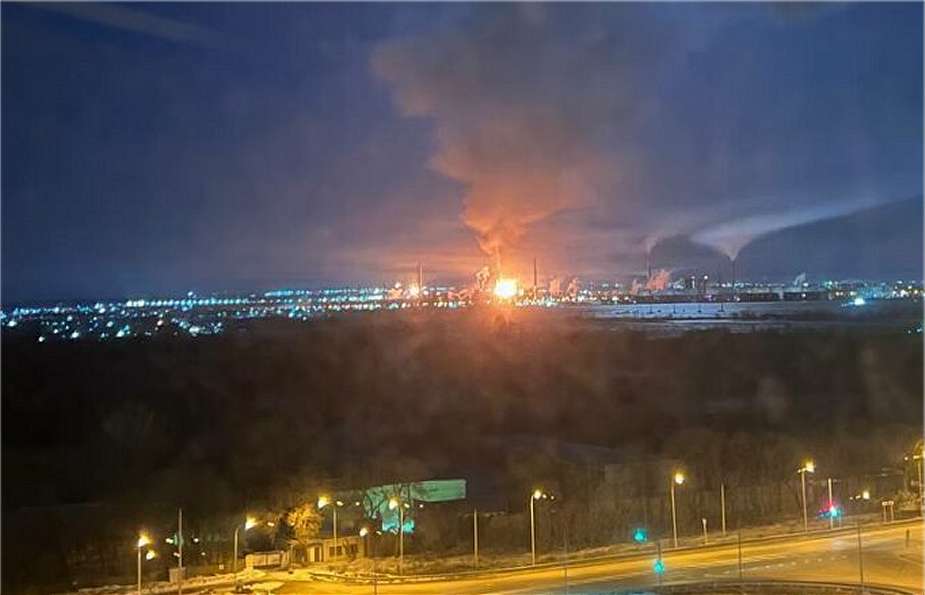Breaking News: Ukraine Targets Russian Oil Refineries with Drone Strikes to Disrupt Fuel Supply
The British Ministry of Defense Intelligence Services announced on March 23, 2023, a new strategy by Ukraine aimed at weakening Russian oil production. In a series of bold and strategically significant aerial attacks, Ukraine has reportedly used Unmanned Aerial Vehicles (UAVs) to strike 12 Russian oil refineries, causing considerable disruptions to Russia's fuel supply and underlining the extended operational reach of the Ukrainian military.
Follow Army Recognition on Google News at this link

Several Russian Telegram channels report that explosions rocked a local oil refinery in Novokuibyshevsk, Samara region, during the night of March 23, 2024. (Picture source Telegram)
The attacks carried out between March 15 and 17, 2024, targeted several large refineries, including three in the Samara oblast in southern Russia. The Ukrainian intelligence official's statement highlights the precision and ambition behind the UAV strikes, which reached facilities approximately 900 km away from Ukraine. This capability to strike deep into Russian territory emphasizes the strategic use of drones by Ukraine to impose financial and logistical pressures on Russia.
The impact of these strikes on Russia's energy sector is significant, with disruptions affecting at least 10 percent of the country's refinery capacity. The immediate effects on the domestic fuel market could escalate, as major repairs might be required for the damaged facilities. These operations are complicated by international sanctions, which could further delay and increase the cost of sourcing necessary replacement equipment.
In response to these UAV attacks, a Russian Energy Ministry official disclosed plans to deploy Pantsir-S1 air defense systems to protect the oil refineries. However, the extensive nature of Russia's energy infrastructure presents a considerable challenge in securing all vulnerable facilities against such aerial threats.
Analysts suggest that these attacks are not merely aimed at causing economic damage but also serve a tactical purpose. By targeting the fuel supply chain, Ukraine seeks to impede the logistical capabilities of Russian forces deployed in Ukraine, potentially slowing down the movement of troops and the launch of new offensives.
The impact of a fuel shortage on Russian military operations in Ukraine could be profound, with far-reaching implications for logistics, operational tempo, and strategic flexibility. Fuel is the lifeblood of modern military operations, powering everything from tanks and armored vehicles to aircraft and support vehicles. A disruption in fuel supply due to Ukrainian strikes on oil refineries would present significant logistical challenges. The immediate effect would be on the ability to sustain operations at current levels. Without a steady supply of fuel, the operational reach of Russian forces could be severely limited, reducing their ability to maneuver, conduct offensive operations, and resupply forward positions.
Moreover, the operational tempo, or the speed at which military operations can be conducted, would likely slow down. This slowdown could lead to missed opportunities on the battlefield and give Ukrainian forces more time to prepare and counteract Russian moves. In a broader strategic context, a fuel shortage could force Russia to rethink its military strategy in Ukraine. It might lead to a greater reliance on non-mechanized units or a shift in focus to defending currently held positions rather than expanding control. Additionally, the need to secure alternative fuel supplies could divert resources from frontline operations, further complicating Russian military efforts.
In the longer term, the inability to adequately fuel military operations could erode the combat effectiveness of Russian forces in Ukraine. This could lead to a stalemate or gradual loss of territories if Ukrainian forces capitalize on Russian logistical vulnerabilities. Overall, the strategic implications of a fuel shortage for the Russian military in Ukraine would not only hinder immediate operational capabilities but could also lead to a significant reevaluation of Russia's military objectives and strategies in the conflict.
News Russia Ukraine War
- Hits: 2220
















